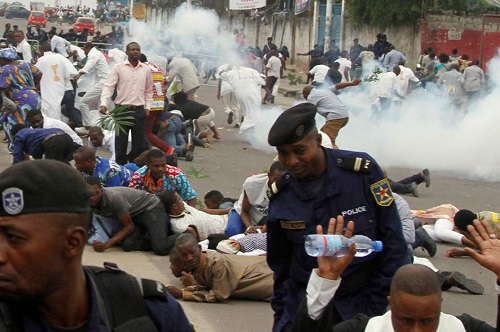Reuters photo
By
Amnesty International
As the Democratic Republic of Congo’s new president Félix Tshisekedi on Sunday marked one month in office, human rights NGO Amnesty International’s Secretary General Kumi Naidoo has called on him to take swift action to address the country’s abysmal human rights record.
“As the new president of Democratic Republic of Congo, you have the unique responsibility and opportunity to ensure that your government moves swiftly to reverse the deteriorating human rights situation in the country,” he said, in an open letter, accompanied by a 10-point proposal for addressing the most pressing human rights issues in the central African country.
“Serious human rights violations and crimes under international law have been committed in the DRC over the last 25 years, claiming the lives of millions of Congolese people over this period, mostly with impunity,” he added.
Felix Tshisekedi should ensure that his government prioritizes the following proposed human rights measures to genuinely and satisfactorily address the dire human rights situation in the country. His new government should:
1. Take concrete steps to improve people’s safety and security by thoroughly and effectively investigating allegations of human rights violations by the security forces and ensuring protection of civilians in conflict-torn areas, particularly Beni, Ituri, Haut-Uélé, Tanganyika and Kasaï, Kwilu and Mai-Ndombe, where security forces have failed in their duty to protect.
2. End repression of dissent and lift the ban on peaceful protests including by instructing all government departments at national and local levels, members of the security forces and intelligence agencies, and other State organs to uphold people’s rights to freedom of opinion and expression, peaceful assembly and association. The Congolese people must be able to freely express their views, including through peaceful demonstrations, without fear of being arrested, tortured, persecuted, disappeared, killed or other forms of reprisals.
3. End internet and media restrictions and shutdowns and urgently enact an enabling law on freedom of the media and access to information and the internet. The government should also abolish the May 2017 ministerial decree on freedom of the press and all other restrictive measures.
4. Abolish the death penalty in law and commute all death sentences to terms of imprisonment. Table in parliament the new draft penal code that is devoid of penalty, as announced by the Minister of Justice in 2017.
5. Take concrete steps to end endemic impunity by
i. ensuring the prosecution of high ranking security officers, politicians and others suspected of serious human rights violations and crimes under international law, including sexual and gender-based violence (SGBV) and rape and ensuring that military officers found guilty of such crimes are discharged from the army;
ii. ensuring suspension of officers in the army, presidential guard, police and intelligence agencies suspected of involvement in serious human rights violations, pending investigations and ensuring the suspects are prosecuted where there is sufficient admissible evidence.
6. Take concrete steps to promote the rule of law and end arbitrariness, notably by releasing all those arbitrarily detained solely for peacefully exercising their human rights; ending arbitrary arrests and detentions; and fully respecting and observing the independence of the judiciary.
7. Champion women’s rights including by taking concrete steps to implement the gender balance provision in the DRC Constitution of at least 30% for women in all decision-making bodies, such as the central government, provincial governments, boards of directors of public companies and the diplomatic corps.
8. Advance the right to education and other economic, social and cultural rights: including by immediately implementing the Constitutional provision on free primary education, taking effective measures to end child labor in the mining sector, and other forms of child exploitation and by engaging in dialogue with stakeholders for the collaborative development and progressive implementation of a comprehensive policy in these sectors.
9. Improve conditions in prisons and detention centres including by inviting the relevant UN and African Commission on Human and Peoples’ Rights’ special rapporteurs to assess conditions in Congolese prisons and detention centers and make concrete proposals for improvement.
10. Strengthen human rights oversight mechanisms: including by guaranteeing, respecting and strengthening the autonomy and independence of the National Human Rights Commission and the Audiovisual and Communications Council and providing them with adequate resources and powers to carry out their missions.
Amnesty International is a non-governmental organisation focused on human rights with over 7 million members and supporters around the world. The stated objective of the organisation is “to conduct research and generate action to prevent and end grave abuses of human rights, and to demand justice for those whose rights have been violated.”



No Comments Yet!
You can be first to comment this post!